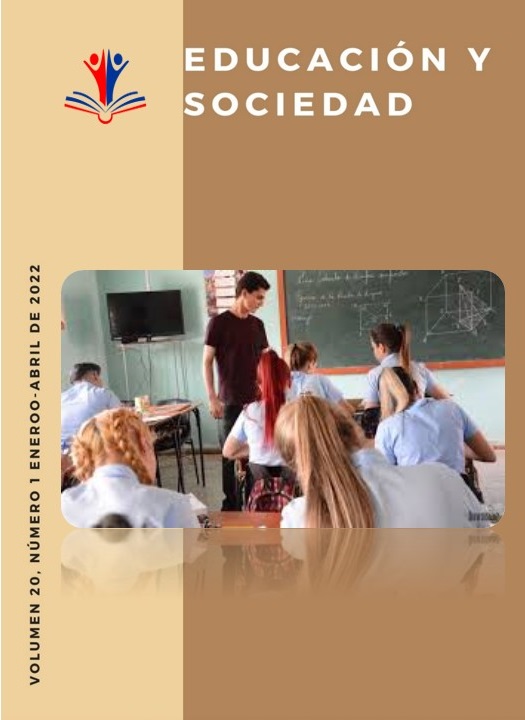Protocol for the implementation of Decree 1421 of 2017, for disabled students of the Santander Educational Institution
Keywords:
compensating education, educational policy, educational program elaboration , inclusive educationAbstract
The objective of this research is to design a protocol for the implementation of Decree 1421 of 2017 at Santander Educational Institution from Tuchín Córdoba municipality, for identifying the
elements of the decree that must be applied, reviewing the institutional policies of the educational institution project regarding the inclusion of students with disabilities, and structuring the protocol to be adopted by the educational institution. This study was conducted with a qualitative approach, with a design based on action research. The results showed that the educational institution does not comply with the guidelines established by the decree. Likewise, teachers know little about the Decree 1421. In addition, the students experience their learning process based on a curriculum design that does not take into account their differences. A protocol structured by means of stages and steps was designed to guide the pedagogical work of teachers as a process.
References
Constitución Política de Colombia de (1991). Editorial Leyer.
Correa, L., Rúa, J. y Valencia, M. (2018). Panorama y retos del derecho a la educación inclusiva de las personas con discapacidad en Colombia. Escuela Para Todos. Laboratorio de Derechos Económicos, Sociales y Culturales. https://bit.ly/3z4spLC
Decreto 1421 de (2017). Por el cual se reglamenta en el marco de la educación inclusiva la atención educativa a la población con discapacidad. Diario Oficial No. 50.340. Presidencia de la República de Colombia, 29 de agosto de 2017. https://bit.ly/3qOsqRD
Flores, M. (2011). Apuntes de metodología de investigación cualitativa. https://www.editorialdigitaltec.com/
Georghiou, L., Cassingena, J. Keenen, M., Miles, I. y Popper, R. (2010). Manual de Prospectiva tecnológica. Conceptos y práctica. Editorial Flacso. https://www.amazon.com/-/es/Luke-Georghiuo/dp/6077629391
Mayan, M. (2001). Una introducción a los métodos cualitativos. Módulo de entrenamiento para estudiantes y profesores. https://bit.ly/3sCwGEV
Pérez, E. (2011). Educación inclusiva y las comunidades de aprendizaje como alternativa a la escuela tradicional. [Trabajo Fin de Máster. Universidad Complutense de Madrid].
Pinto, J. P. (2015). Propuesta Metodológica para la Planificación Estratégica Prospectiva de un Instituto de Educación Superior de Defensa en el Ecuador. En Planeación Prospectiva Estratégica. (411–435). https://www2.politicas.unam.mx/publicaciones/wp-content/uploads/2015/08/Libro-PPE_interactivo1.pdf
Ferrer, F., Rambla, X., Tarabini, A. y Verger, A. (2008). La educación inclusiva frente a las desigualdades sociales: un estado de la cuestión y algunas reflexiones geográficas. Perspectivas, XXXVIII (1), 81-96.
Salamanca, A. B. (2019). Checklist para autores y checklist para lectores: diferentes herramientas con diferentes objetivos. Nure Inv. 16(99), 1-4.
Valenciano, G. (2009). Construyendo un concepto de educación inclusiva: una experiencia compartida. En Sarto, M. P. y Venegas, M. E. (Edit.) Aspectos clave de la Educación Inclusiva. (13-24). Publicaciones del INICO. https://sid.usal.es/idocs/F8/FDO22224/educacion-inclusiva.pdf
Published
How to Cite
Issue
Section
License
Copyright (c) 2021 Educación y sociedad

This work is licensed under a Creative Commons Attribution-NonCommercial 4.0 International License.
Los autores ceden su derecho de autor a Educación y Sociedad y otorgan a todos los usuarios potenciales, de manera irrevocable y por un período de tiempo ilimitado, el derecho de utilizar, copiar, transformar y distribuir el contenido. La cesión de derecho de autor incluye también:
- Traducir, adaptar, reutilizar, resumir el trabajo y ejercer todos sus derechos sobre dichas adaptaciones, resúmenes, extractos y obras derivadas.
- Incluir el trabajo y su versión traducida, adaptada o resumida, total o parcialmente, en bases de datos informatizadas, selección o recopilación de textos digitales o impresos a disposición de terceros.
Cada autor asume que en caso de que el artículo fuese aprobado para su publicación en la revista Educación y Sociedad:
- Cede sus derechos patrimoniales y autoriza al comité editorial para la publicación del documento con el correo electrónico y la afiliación institucional de los autores.
- Autoriza la divulgación en la página web de la revista, en repositorios y directorios en se incluye o pueda incluirse en el futuro.
- Certifica que ha contribuido directamente al contenido intelectual de este manuscrito.
- Se responsabiliza públicamente con su contenido y acepta que su nombre figure en la lista de autores.
- Garantiza que el artículo es un documento original y no ha sido publicado total ni parcialmente, en ningún otro lugar.
- No ha incurrido en fraude científico, plagio o vicios de autoría; en caso contrario se exime de toda responsabilidad a la revista Educación y Sociedad y se declara responsable.
- Se compromete a no presentar este artículo a otra revista para su publicación, hasta recibir la decisión de la editorial de la publicación sobre el concepto final.











